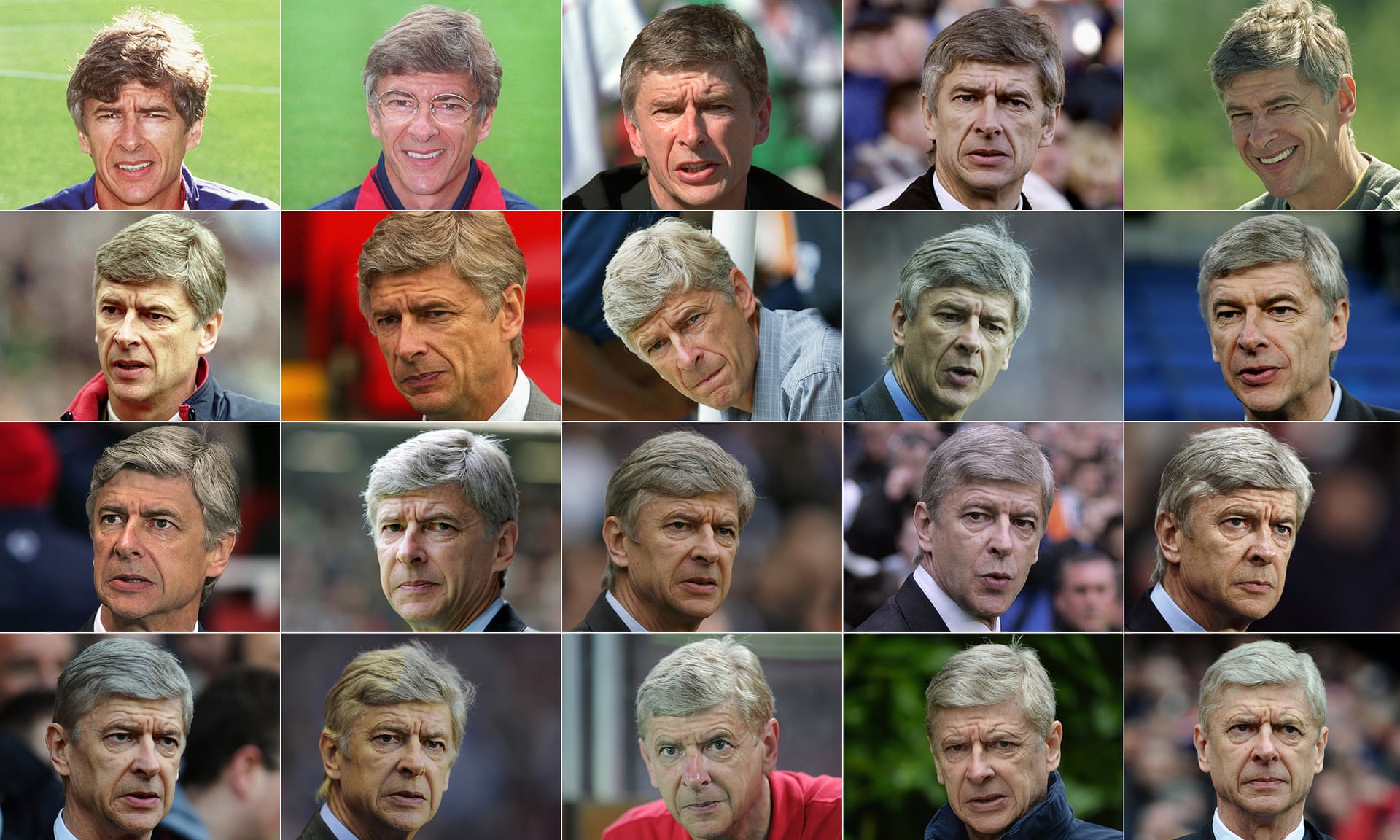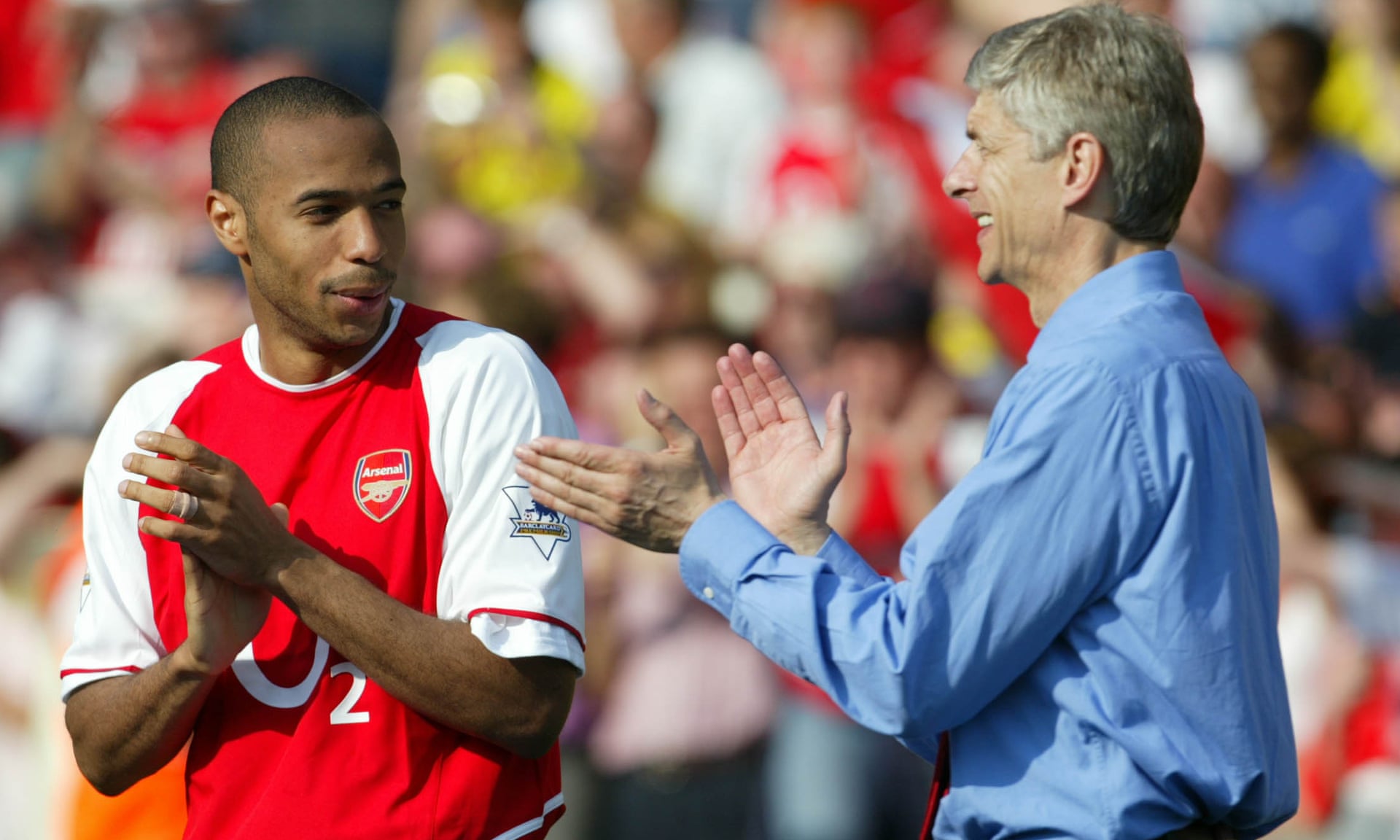
Arsène Wenger should have won more but English football owes him a lot
The Frenchman took the reins at Arsenal 20 years ago today and despite leaner times in recent years his impact and influence is undeniable
Today marks 20 years at Arsenal for the Premier League's longest serving manager Arsene Wenger. Three titles, one invincible season, what are your favourite memories of Wenger's time in the Premier League?Happy anniversary then, Arsène. You were the future once. Like most ageing pop culture icons Arsène Wenger has by now pretty much completed the full circuit from youthful innovator, new broom and all-round king of the wild frontier to something that looks a bit like the opposite: stick in the mud, barnacle, emissary from the distant past.
For those who remember Wenger’s unveiling in English football – the brilliant surprise of our own thin white duke, so ludicrously tall and rangy, a man nailed together out of deckchair slats – there is something startling about the tone of his late days at Arsenal. The idea of Wenger as an obstacle to progress, Arsenal’s own dinosaur general is a perfect example of sport’s restlessness, the need constantly to move on and reinvent. These are necessary corrections. The truth as ever lies somewhere in between.
This Thursday marks the 20th anniversary of Wenger’s first day as Arsenal manager. It has been a glorious, transformational, by the end oddly repetitive managerial reign. In the court of public opinion Wenger’s Hunky Dory, Ziggy Stardust and Heroes are very much behind him. He stands before us now stuck in his extended Tin Machine phase. Albeit in this case the dominant career notes are not constant revolution, but a maddening kind of constancy.
“A tall slim, Frenchman walks in and steps up on to the dais. Arsène Wenger is, we quickly realise, a completely different animal.” The opening passage in Myles Palmer’s excellent, utterly besotted book The Professor, published in the hazy glory days of 2001, captures the shock of first contact.
Hindsight is a useful thing here. In many ways the Premier League’s double-take at Wenger’s early impact says as much about its own backward mid-1990s sensibilities as it does Wenger’s modernisms: the grilled broccoli, produced with a swish from his magician’s hat; the revelation that drinking nine pints of lager and jumping up and down in a circle might not be ideal post-match warm down.
It turns out Wenger’s real triumph in those early years wasn’t so much his methods as the same qualities that have come to define his late period. Arsenal have moved house. Mini-eras have come and gone. Regular title challenges have congealed into an established backseat role among Europe’s elite. Throughout which Wenger has been defined by the base notes that allowed him to challenge so insistently the orthodoxies in English football when he first arrived. Stubbornness. Persuasive charm. An insistence, above all, on remaining completely himself. Plus ça change, as they say in Islington.
‘Managers from Alex Ferguson to Sam Allardyce have acknowledged their own debt to Wenger’. Composite: Getty Images & Colorsport/Rex
It might have all been very different. Arsenal initially wanted Bobby Robson as a long-term manager. Robson even agreed to join only to be cajoled into staying at Porto. Wenger was on a list of more expansive alternatives. He’d first met David Dein at a dinner party in 1989 where Wenger’s charm, ability at charades (he acted out A Midsummer Night’s Dream) and his – yes really – exceptional dancing skills marked him out as a rare bird.
Seven years later Wenger’s unveiling at Highbury on a late September Sunday drew the famous “Arsène Who?” headline in the Evening Standard. The following week the Sunday Mirror mocked Dein’s chances of “persuading us that the lanky M’sieur Wenger, despite sounding like Rory Bremner auditioning for ‘Allo ‘Allo, is ‘ow you say fantastique!”.
Looking back now this is more a tale of English football’s insularity at the time. This was the same M’sieur Wenger who had stood on stage in Milan that same year with George Weah at the Fifa World Footballer of the Year award, Weah declaring: “Arsène Wenger made me not just the player I am today, but also the man I am.” No? Still not ringing any bells?
Wenger’s timing was good though. Not only was the Arsenal dressing room ready for reform, a recovering alcoholic its dominant personality. The top tier of English football was swollen with new money, ready to engage, and captivated from the start by the revolutionary driving, passing football of a man the British press would refer to as “The Professor” 703 times over the next 12 years.
Wenger was also lucky. There was plenty of low hanging fruit to be hoovered up in the early years, a seam of wonky nutrition and booze-soaked sinews to be mined. As Arsenal began to win English football was genuinely awed by the sheer future-shock of pasta, yoga, the gimmickry with dentistry and team bus thermostats and “periods of silence” at half-time. See the Frenchman, with his iron horse, his monkey glands. Really though Wenger was simply steadfast, decisive and brilliantly sure of himself in those early years, a “football alcoholic” in Mark Hateley’s phrase, better on the details every time.
His legacy in England will be defined in three stages. First Wenger was simply the first. The first successful overseas manager, first to challenge openly the stodgy parts of the culture, a hugely assertive midwife at what might have been a difficult rebirth. In his wake levels were raised everywhere. Managers from Alex Ferguson to Sam Allardyce have acknowledged their own debt, the necessary tightening of standards. A mark had been set, a new orthodoxy ingrained.
Secondly there is simply the sublime football of Wenger’s best teams, a style of soft-shoed pass and move that will stand as some of the finest seen in England. Never mind trophies, Wenger’s legacy is the spectacle of an unfettered Thierry Henry in full flow, the synergy between his best midfields, even some of those forgotten midweek nights where Alexander Hleb or Andrei Arshavin plus a group of slick young won’t-ever-bes pumped four past some team of grimacing mid-table unfortunates.
Arsène Wenger transformed Thierry Henry from an uncelebrated winger into one of the most prolific strikers of the Premier League era. Photograph: Tom Jenkins for The Guardian
Thirdly Wenger can claim a major hand in the Premier League’s own period of historic dominance between 2005 and 2011 when technical players allied to an ingrained physicality created a new tempo in European football. Wenger made this possible, showed how the “traditional” British running style could be married with refined technique and quick, accurate passing; creating a refined power game that Real Madrid, among others, have risen to in recent years.
Even in the shrinking back of the last few seasons, a period when Arsenal have lacked teeth not talent, there has been something beautiful about Wenger’s own thinning out, the brittle asceticism of Arsenal’s football, with a manager who has become more minimal, more dilute, more self-defeatingly himself. At times watching Wenger trying to ramp this team up into champion mode again the thought has occurred that he enjoyed the challenge of austerity much more, those skin-of-the-teeth years where he kept the club breathing Champions League air, shrinking the debt, and all the while enacting his vision of frictionless global Wengerball beneath the lights of the new enormodrome.
Wenger should have won more league titles. In the post-Özil era last season looks the most obvious missed opportunity. Arsenal might have also won a Champions League in the Henry years when nothing was beyond them. Wenger has also probably outstayed his most effective period by two seasons, although this is always an untested line of reasoning. Either way it has been a genuinely fascinating 20 years during which Arsenal FC and English football itself have been transformed, both for the better under Wenger’s tenacious, wilful reforming influence.
Share this news articles:
Followed us at Facebook, Twitter, and Telegram for top news football soccer stories everyday.
Click 👉 https://t.me/Obsesbola
Tags:








Post a Comment
0Comments